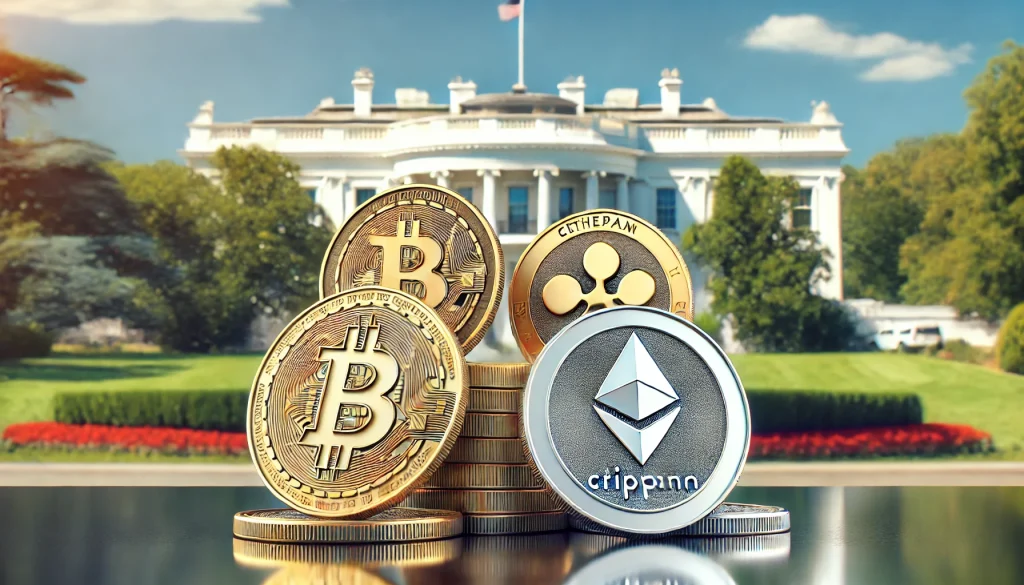Kuala Lumpur, 7 March, 2025, The White House Crypto Summit, hosted by President Donald Trump on March 7, 2025, has generated intense speculation and anticipation across the global cryptocurrency industry. With high-profile attendees, including industry leaders, policymakers, and financial executives, the event is seen as a potential game-changer for the U.S. crypto landscape.

As discussions unfold, analysts are speculating on the possible outcomes and policy shifts that could emerge from this landmark summit.
Who’s Attending? The Key Players at the White House Crypto Summit
The summit brings together some of the most influential figures in the cryptocurrency space.
Confirmed Attendees:
Industry Leaders & Crypto Executives
- Michael Saylor – Executive Chairman, MicroStrategy (BTC proponent, large-scale corporate BTC investor)
- Brian Armstrong – CEO, Coinbase (leading U.S. crypto exchange)
- Vlad Tenev – CEO, Robinhood (crypto-friendly trading platform)
- Brad Garlinghouse – CEO, Ripple (pushing for regulatory clarity in the U.S.)
- J.P. Richardson – CEO, Exodus (self-custody crypto wallet provider)
- Matt Huang – Co-founder, Paradigm (crypto venture capital firm)
- Sergey Nazarov – Co-founder, Chainlink (decentralized oracle network)
- David Bailey – CEO, Bitcoin Magazine (long-time BTC advocate and media figure)
Government Officials & Policy Makers
- President Donald Trump – Leading discussions on crypto and U.S. digital finance strategy
- David Sacks – White House AI and Crypto Czar (overseeing blockchain policy)
- Bo Hines – Executive Director, President’s Working Group on Digital Assets (administering summit discussions)
Unconfirmed Attendees & Potential Surprises
While the confirmed list is already significant, several high-profile figures have not been officially confirmed but are rumored to attend based on insider reports. These include:
- Elon Musk – CEO of Tesla, SpaceX, and X (formerly Twitter), who has been vocal about Dogecoin, Bitcoin, and AI-driven blockchain applications. If Musk attends, discussions could involve crypto payments on X and potential government partnerships.
- Cameron & Tyler Winklevoss – Founders of Gemini, one of the largest U.S.-based crypto exchanges, and early Bitcoin investors. Their presence would indicate discussions on exchange regulations and institutional Bitcoin adoption.
- CZ (Changpeng Zhao) – Former CEO of Binance, who has been involved in regulatory challenges in the U.S. While his legal battles might prevent attendance, Binance’s impact on the global market makes this a speculation-worthy topic.
- Cathie Wood – CEO of Ark Invest, a leading institutional investor in Bitcoin ETFs. If present, she could advocate for Bitcoin as a strategic institutional asset.
- Mark Cuban – Billionaire investor, crypto advocate, and owner of the Dallas Mavericks, who has been critical of SEC policies on crypto regulation. His attendance would likely signal pro-business regulatory discussions.
Strategic Bitcoin Reserve: The First Major Move
Ahead of the summit, President Trump signed an executive order on March 6, 2025, establishing a Strategic Bitcoin Reserve. The initiative aims to utilize Bitcoin seized from illicit activities to build a national digital asset reserve without taxpayer funding.
According to David Sacks, the White House AI and Crypto Czar, the government is currently in possession of approximately 200,000 BTC, which could form the backbone of this reserve. While the U.S. is not planning direct Bitcoin purchases, this move signals a shift in policy—acknowledging Bitcoin as a legitimate national asset.
Market Reaction: Bitcoin initially dipped to $85,000 following the news, before stabilizing near $88,000, as traders adjusted to the realization that there would be no immediate large-scale government buying.
What Policy Changes Could Emerge from the Summit?
While the official agenda remains undisclosed, several speculative theories have emerged regarding the summit’s key takeaways:
1. Expansion of the Strategic Crypto Reserve
With Bitcoin now recognized as a strategic asset, there is speculation that the U.S. government might consider adding Ethereum (ETH), Ripple (XRP), Solana (SOL), and Cardano (ADA) to a broader U.S. Crypto Reserve. This could validate the long-term value of these digital assets and influence global adoption.
2. Regulatory Clarity & Institutional Adoption
One of the most pressing issues in the U.S. crypto market is regulatory uncertainty. Industry leaders have long advocated for clear guidelines on digital asset taxation, exchange regulations, and stablecoin oversight.
The summit is expected to lay the groundwork for a bipartisan stablecoin bill, providing clarity for companies operating in the space. Additionally, there could be discussions on crypto ETFs, SEC oversight, and banking regulations related to digital assets.
3. Energy and Crypto Mining Policies
With Bitcoin mining often criticized for its environmental impact, the summit could introduce new proposals linking crypto mining to renewable energy sources. This aligns with previous initiatives to decarbonize blockchain networks and promote eco-friendly mining solutions.
4. AI and Crypto Integration
Given the rapid advancements in artificial intelligence (AI), some experts speculate that the U.S. might explore AI-driven blockchain solutions. This could involve AI-powered trading platforms, decentralized finance (DeFi) automation, and smart contract enhancements.
5. Market Impact and Future Outlook
The outcomes of this summit could have far-reaching implications for the global crypto industry. If the U.S. government moves toward a friendlier regulatory framework, we could see institutional investors re-entering the market and long-term bullish momentum for digital assets.
However, if regulations remain unclear or overly restrictive, it could push crypto innovation offshore, allowing countries like Dubai, Singapore, and Switzerland to lead the next wave of blockchain growth.
A Defining Moment for U.S. Crypto Policy
As the world watches, the White House Crypto Summit has the potential to reshape the U.S. digital asset landscape. Whether it results in a regulatory breakthrough or continued uncertainty, one thing is certain—the future of cryptocurrency in the U.S. is now firmly on the political agenda.
Stay tuned to ForwardMalaysia.my for real-time updates and in-depth analysis of the summit’s outcomes.